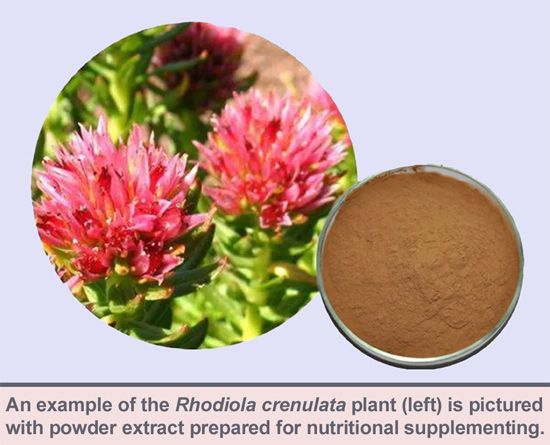According to a new study from Taiwan, supplementing with a Rhodiola crenulata extract prior to takeoff could help pilots maintain blood oxygen levels and combat cognitive impairment at high altitudes.
Rhodiola is a genus of perennial plants that grow in high-altitude regions.
The indigenous peoples who live in these areas have used the plant medicinally for thousands of years.
One of the benefits the plant has traditionally provided is helping people survive in the thin air at high altitudes; and now, in the modern era, researchers are starting to prove these assertions scientifically.
The species used for the new Taiwanese study is Rhodiola crenulata, which is grown primarily in the high-altitude regions of the Tibet, Sichuan and Yunnan provinces in China. Like Rhodiola rosea, it is known for its potent adaptogenic properties; however, Rhodiola crenulata has been found to have a higher phytochemical content and antioxidant activity since it grows under harsher conditions at higher altitudes.
Military interest
One group that is thought could benefit from the unique benefits of Rhodiola crenulata is pilots—and this has interested some of the world’s militaries.
Successful flight missions rely on normal cognitive function across mental processes, but oxygen shortages at high altitudes may interfere with optimal attention, memory, speech, problem-solving and judgment. This can happen despite the fact that the pilots are located inside a pressurized cabin, the researchers noted.
A 2010 U.S. Army Aeromedical Research Laboratory study showed that even moderate levels of hypoxia significantly degraded the ability of military instructor pilots to perform a precision slow flight task at 18,000 feet.
Anyone who has experienced an emergency in a regular commercial jetliner will know that the pilots immediately descend to 10,000 feet. This is recognized internationally as the highest altitude most people can breathe normally, so the pilots endeavor to bring the aircraft to this altitude before the supplemental oxygen (through a mask) runs out.
2,000 Years of Rhodiola
The genus Rhodiola has a history dating back thousands of years. It was used in the Roman army as early as 90 AD, and celebrates an even longer history in Traditional Chinese Medicine.
Rhodiola’s traditional medicinal uses include memory enhancement, energy and work productivity, depression and numerous age-related health conditions.
Read our Rhodiola primer article here to learn more.
Rhodiola crenulata, of course, is not a magic pill that replaces oxygen; however, studies have shown that its unique properties help improve the tolerance to oxygen deprivation, giving pilots more time before the onset of cognitive decline.
According to the Taiwanese researchers previous studies have shown that Rhodiola crenulata effectively prevented hypoxia-induced oxidative stress and endothelial damage in hypoxic conditions.
It has also been shown to increase aerobic exercise performance in the same oxygen-deprived conditions.
“Rhodiola crenulata has demonstrated in vitro and in vivo antihypoxic properties. However, its effect on hypoxia-induced cognitive impairment remains unclear,” the researchers wrote in the study intro. “We hypothesized that Rhodiola could improve cognitive function under hypoxic conditions by increasing oxygen saturation. To explore this, we conducted this study, with an aim to improve the overall flight safety of pilots.”
Small but insightful study
The study recruited 39 healthy adults and administered either a dose of Rhodiola crenulata extract or a placebo 48 hours before performing a battery of cognitive tasks under normal oxygen concentration and also at low oxygen conditions (hypoxic) at atmospheric pressure.
The study, referred to as a “repeated-measures study” involved the participants completing four sessions in the various oxygen concentrations and in a randomized order. The participants then switched groups after a two-week washout period.
In each trial, subjects wore a medical-grade oxygen breathing mask supplied with 7% oxygen. The mask was worn for 30 minutes at an ambient pressure of 760 mmHg to induce hypoxia. The concentration of oxygen in the gas mixture was set at 49.91 mmHg, which is equivalent to breathing air at an altitude of 25,000 feet.
To evaluate outcomes the researchers tracked blood oxygen saturation level, evaluated symptoms by questionnaire and tested stress saliva.
Results
“We found that pretreatment with Rhodiola crenulata extract effectively prevented oxygen saturation and hypoxia-impaired cognitive function,” the researchers concluded. “Moreover, we found that pretreatment with Rhodiola crenulata extract significantly attenuated the severity of hypoxia-induced acute mountain sickness.”
The research was published in the Journal of Herbal Medicine in September 2023.
The study was supported by grants from the Taiwanese Ministry of Science and Technology and the Ministry of National Defense-Medical Affairs Bureau.
While it’s not likely that the findings of this study will immediately result in tens of thousands of pilots around the world starting to take Rhodiola supplements before they fly, it does mean that larger studies are likely to follow. Especially considering military departments with deep pockets are interested.
In the meantime, the implications are more broad: If Rhodiola is able to help get oxygen to cells, it is likely it can provide vital nutritional support for many other challenging health conditions and diseases.
Find Rhodiola in the following Optimal Health Systems products:
• Tru-Energy Pak
• Natural Z Pak
• Optimal B Awake
• Pre-conditioning Pak
– – –
Source: Journal of Herbal Medicine.


